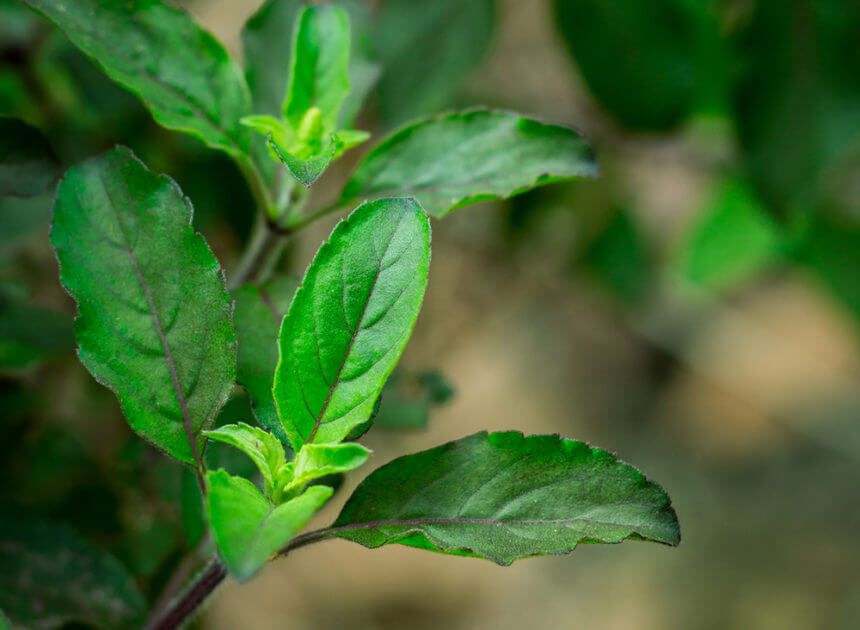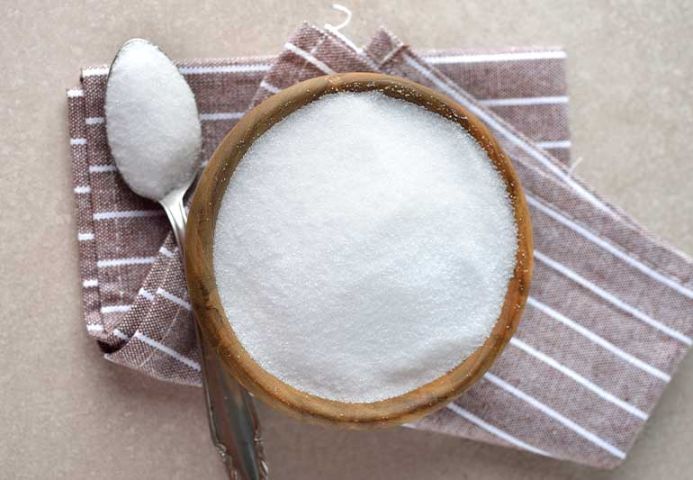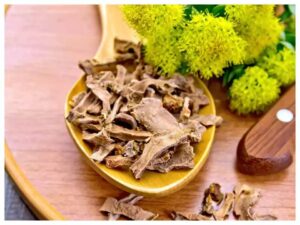The Discovery of Holy Basil: An Enigmatic Tale of Chance and Mystery
The Ancient Roots of Holy Basil
The discovery of Holy Basil, also known as Tulsi, is shrouded in the enigmatic tales of ancient Indian folklore. According to Hindu mythology, Lord Vishnu, one of the three supreme deities in Hinduism, was incarnated as a plant that we now know as Holy Basil. Tulsi is considered a sacred plant in Hinduism, and its leaves are used in various religious ceremonies and rituals. The plant is also believed to have medicinal properties and has been used in Ayurvedic medicine for thousands of years.
The Chance Discovery by a Wandering Saint
The story of the discovery of Holy Basil is not well documented, but it is said to have been discovered by a wandering saint in the forests of India. The saint is said to have been on a spiritual quest and was wandering through the forests when he stumbled upon a plant with leaves that emitted a fragrant aroma. Intrigued by the fragrance, the saint plucked a few leaves and tasted them. He was surprised by the plant’s unique taste and aroma and decided to take some back to his ashram.
The Mysterious Properties of Holy Basil
Upon returning to his ashram, the wandering saint shared the leaves with his disciples and was amazed by the plant’s properties. The plant was found to have a calming effect on the mind and body, and its leaves were said to improve digestion and relieve symptoms of respiratory illnesses. The plant was also believed to have anti-inflammatory and anti-bacterial properties.
Holy Basil’s Journey from the Forest to the Modern World
The discovery of Holy Basil by the wandering saint was the beginning of its journey from the forest to the modern world. The plant’s medicinal properties were soon recognized by Ayurvedic practitioners, and it was incorporated into various remedies and formulations. Holy Basil also gained popularity among the general population and was used as a home remedy for various ailments.
The Modern Scientific Understanding of Holy Basil
In recent years, Holy Basil has gained attention from modern science, and various studies have been conducted to investigate its medicinal properties. Research has shown that Holy Basil has antioxidant and anti-inflammatory properties, and its leaves contain essential oils that have a calming effect on the mind and body. Holy Basil has also been found to have a positive effect on respiratory illnesses, and its leaves contain compounds that can lower blood sugar levels.
Conclusion: A Mysterious and Enigmatic Plant
The discovery of Holy Basil is a mysterious and enigmatic tale that has been passed down through the ages. The plant’s unique taste and aroma, as well as its medicinal properties, have made it a beloved plant in Ayurvedic medicine and Hindu culture. While the exact origins of Holy Basil may remain a mystery, its medicinal properties have been recognized and studied by modern science, making it a valuable plant for both traditional and modern medicine.
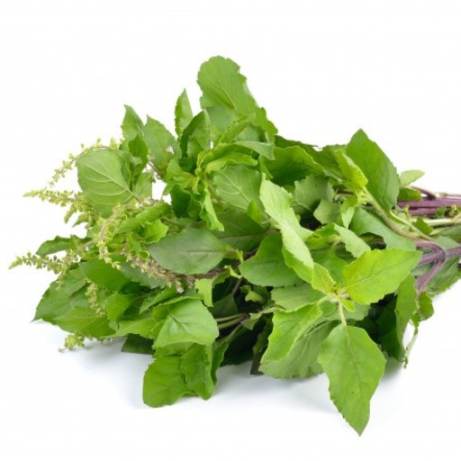
The Health Benefits of Holy Basil: An In-Depth Exploration
Introduction: The Sacred Herb of Ayurveda
Holy Basil, also known as Tulsi, is a sacred herb in Ayurvedic medicine and Hindu culture. The plant has been used for thousands of years for its medicinal properties and is known for its ability to promote health and well-being. In this article, we will explore the many health benefits of Holy Basil and how it can improve various aspects of our health.
Anti-inflammatory Properties of Holy Basil
One of the most well-known health benefits of Holy Basil is its anti-inflammatory properties. Inflammation is a natural response of the body’s immune system to protect against harmful pathogens and injuries. However, chronic inflammation can lead to various health problems such as arthritis, heart disease, and cancer.
Research has shown that Holy Basil contains compounds that can reduce inflammation in the body. The essential oil in Holy Basil contains eugenol, which has been found to have anti-inflammatory properties. A study conducted on rats found that Holy Basil extract reduced inflammation and oxidative stress in the liver. Additionally, a study on humans with osteoarthritis found that Holy Basil extract reduced pain and improved joint function.
Antioxidant Properties of Holy Basil
Holy Basil is also known for its antioxidant properties. Antioxidants are molecules that can neutralize free radicals, which are unstable molecules that can damage cells and contribute to various health problems such as cancer, heart disease, and aging.
Research has shown that Holy Basil contains compounds that have antioxidant properties, including flavonoids and phenolic acids. A study conducted on rats found that Holy Basil extract increased antioxidant enzyme activity and reduced oxidative stress in the liver. Additionally, a study on humans with type 2 diabetes found that Holy Basil extract reduced oxidative stress and improved antioxidant enzyme activity.
Benefits for Respiratory Health
Holy Basil has been traditionally used to improve respiratory health, and modern research has shown that it can be an effective remedy for various respiratory problems.
A study conducted on rats found that Holy Basil extract reduced airway inflammation and mucus production, which can help alleviate symptoms of respiratory illnesses such as asthma and bronchitis. Additionally, a study on humans with chronic obstructive pulmonary disease (COPD) found that Holy Basil extract improved lung function and reduced symptoms such as coughing and shortness of breath.
Benefits for Heart Health
Heart disease is the leading cause of death worldwide, and research has shown that Holy Basil can be beneficial for heart health.
A study conducted on rats found that Holy Basil extract reduced blood pressure and improved heart function. Additionally, a study on humans with metabolic syndrome found that Holy Basil extract reduced cholesterol levels and improved blood sugar control.
Benefits for Brain Function
Holy Basil has been traditionally used as a brain tonic, and modern research has shown that it can improve brain function and reduce the risk of neurological diseases.
A study conducted on rats found that Holy Basil extract improved cognitive function and reduced memory impairment. Additionally, a study on humans with mild cognitive impairment found that Holy Basil extract improved cognitive function and reduced oxidative stress.
Benefits for Digestive Health
Holy Basil has been traditionally used to improve digestive health, and modern research has shown that it can be an effective remedy for various digestive problems.
A study conducted on rats found that Holy Basil extract reduced stomach ulcers and improved digestion. Additionally, a study on humans with irritable bowel syndrome (IBS) found that Holy Basil extract reduced symptoms such as abdominal pain and bloating.
Benefits for Skin Health
Holy Basil has been traditionally used to improve skin health, and modern research has shown that it can be an effective remedy for various skin problems.
A study conducted on rats found that Holy Basil extract reduced skin inflammation and protected against UV damage. Additionally, a study on humans with acne found that Holy Basil extract reduced the severity of acne and improved the overall appearance of the skin.
Benefits for Immune System
Holy Basil has been traditionally used to boost the immune system, and modern research has shown that it can be an effective remedy for various immune system problems.
A study conducted on rats found that Holy Basil extract increased the production of immune cells and improved immune function. Additionally, a study on humans with chronic stress found that Holy Basil extract improved immune function and reduced stress-related symptoms.
Benefits for Oral Health
Holy Basil has been traditionally used to improve oral health, and modern research has shown that it can be an effective remedy for various oral health problems.
A study conducted on rats found that Holy Basil extract reduced the growth of bacteria that cause dental cavities. Additionally, a study on humans with gingivitis found that Holy Basil mouthwash reduced inflammation and improved gum health.
How to Use Holy Basil
There are several ways to use Holy Basil for its health benefits. The most common way is to make tea from the leaves. Simply steep a few leaves in hot water for 5-10 minutes and drink. Holy Basil leaves can also be used in cooking to add flavor to dishes.
Holy Basil supplements are also available in the form of capsules, tinctures, and extracts. It is important to follow the recommended dosage on the supplement label and consult with a healthcare provider before taking any supplements.
Conclusion: A Versatile Herb with Numerous Health Benefits
Holy Basil is a versatile herb with numerous health benefits. Its anti-inflammatory and antioxidant properties make it a valuable remedy for various health problems, including respiratory illnesses, heart disease, and skin problems. Additionally, Holy Basil can improve brain function, boost the immune system, and improve oral and digestive health. Whether taken in tea, supplements, or as a culinary ingredient, Holy Basil is a powerful herb that can promote overall health and well-being.
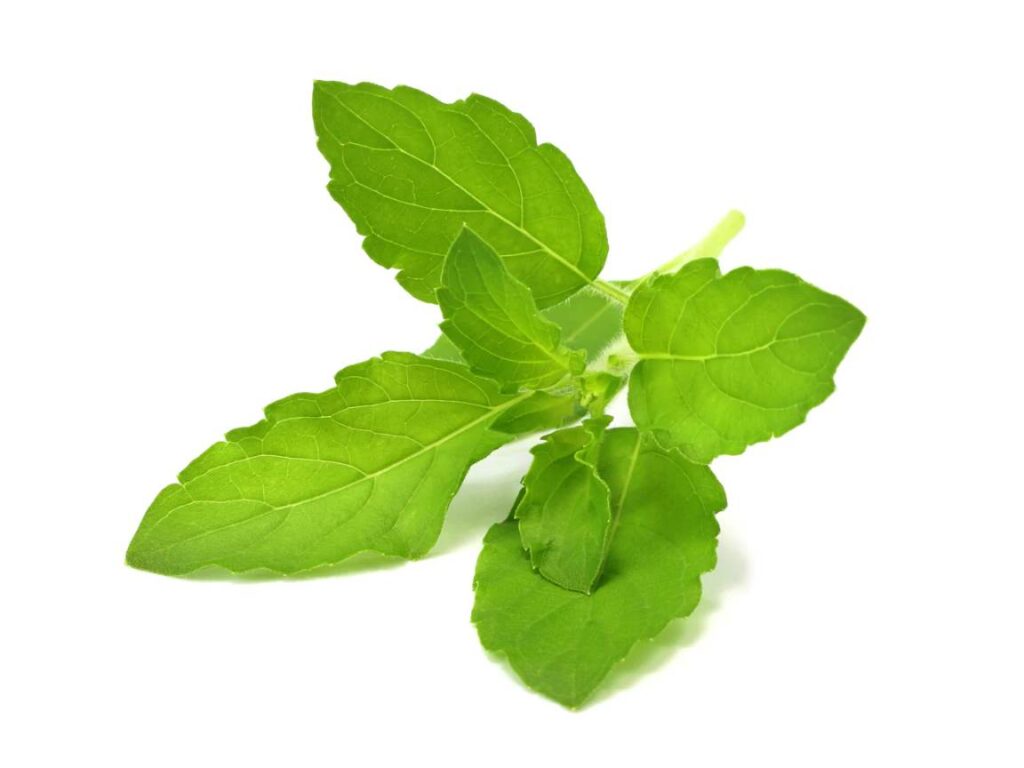
The Nutritional Components and Core Ingredients of Holy Basil
Nutritional Components of Holy Basil
Holy Basil is a rich source of various nutrients, including vitamins, minerals, and antioxidants. Here are some of the key nutritional components of Holy Basil:
Vitamins
Holy Basil contains high levels of vitamins A, C, and K. Vitamin A is important for maintaining healthy vision, skin, and immune system. Vitamin C is an antioxidant that helps protect the body against free radicals and plays a role in collagen production. Vitamin K is important for blood clotting and bone health.
Minerals
Holy Basil is a good source of minerals such as calcium, iron, and magnesium. Calcium is important for bone health, muscle function, and nerve transmission. Iron is necessary for the production of red blood cells and oxygen transport. Magnesium is important for muscle and nerve function, as well as bone health.
Antioxidants
Holy Basil contains various antioxidants, including flavonoids and phenolic acids. Antioxidants help protect the body against free radicals and oxidative stress, which can contribute to various health problems such as cancer, heart disease, and aging.
Core Ingredients of Holy Basil
Holy Basil contains various bioactive compounds that contribute to its health benefits. Here are some of the key core ingredients of Holy Basil:
Eugenol
Eugenol is a compound found in Holy Basil essential oil that has anti-inflammatory and antioxidant properties. Eugenol has been found to reduce inflammation in the body and protect against oxidative stress.
Ursolic Acid
Ursolic acid is a compound found in Holy Basil leaves that has been found to have anti-inflammatory and antioxidant properties. Ursolic acid has been found to reduce inflammation and oxidative stress in various tissues, including the liver and brain.
Rosmarinic Acid
Rosmarinic acid is a compound found in Holy Basil leaves that has been found to have anti-inflammatory, antioxidant, and antimicrobial properties. Rosmarinic acid has been found to reduce inflammation and oxidative stress in various tissues, including the liver, brain, and skin.
Other Key Ingredients of Holy Basil
In addition to eugenol, ursolic acid, and rosmarinic acid, Holy Basil contains various other bioactive compounds that contribute to its health benefits. Here are some of the other key ingredients of Holy Basil:
Ocimumosides
Ocimumosides are a group of compounds found in Holy Basil leaves that have been found to have neuroprotective properties. Ocimumosides have been found to improve cognitive function and reduce memory impairment.
Beta-caryophyllene
Beta-caryophyllene is a compound found in Holy Basil essential oil that has anti-inflammatory and analgesic properties. Beta-caryophyllene has been found to reduce inflammation and pain in various tissues, including the brain and gut.
Luteolin
Luteolin is a flavonoid found in Holy Basil leaves that has anti-inflammatory and antioxidant properties. Luteolin has been found to reduce inflammation and oxidative stress in various tissues, including the brain and liver.
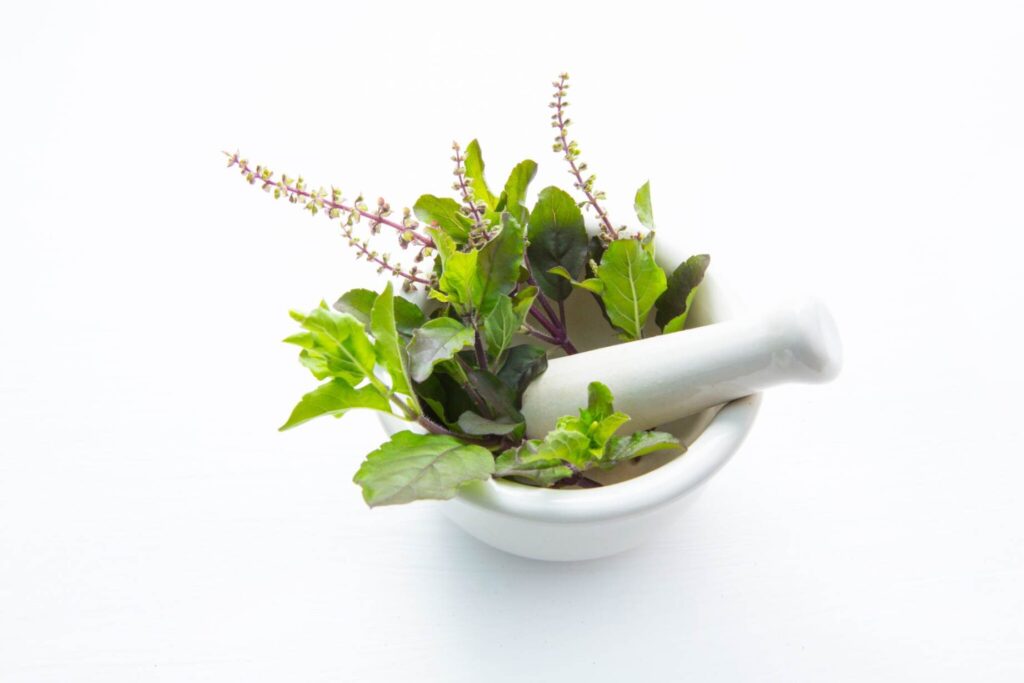
Methods for Consuming Holy Basil: A Comprehensive Guide
Drinking Holy Basil Tea
Drinking Holy Basil tea is one of the most common ways to consume this herb. To make Holy Basil tea, simply steep a few fresh or dried leaves in hot water for 5-10 minutes. Holy Basil tea has a slightly sweet and spicy flavor and is often consumed for its calming and soothing effects on the mind and body.
Holy Basil tea can be consumed as is or combined with other herbs such as ginger or lemongrass to enhance its flavor and medicinal properties. It can be consumed hot or cold and is a refreshing and healthy alternative to sugary drinks.
Using Holy Basil in Cooking
Holy Basil is also commonly used in cooking to add flavor to dishes. The leaves of Holy Basil have a slightly peppery and spicy flavor and are often used in Thai and Indian cuisine.
Holy Basil leaves can be added to soups, stews, curries, stir-fries, and salads. They can also be used to flavor drinks such as smoothies and juices. Holy Basil leaves can be used fresh or dried, and their flavor is often enhanced when combined with other herbs and spices.
Taking Holy Basil Supplements
Holy Basil supplements are also available in various forms, including capsules, tinctures, and extracts. Holy Basil supplements are often used to promote overall health and well-being, and they are particularly beneficial for reducing inflammation, improving respiratory health, and boosting the immune system.
It is important to follow the recommended dosage on the supplement label and consult with a healthcare provider before taking any supplements.
Using Holy Basil Essential Oil
Holy Basil essential oil is another way to consume this herb. Holy Basil essential oil is extracted from the leaves of the plant and is often used for its calming and soothing effects on the mind and body.
Holy Basil essential oil can be diffused in the air, added to bathwater, or applied topically to the skin. It is important to dilute the essential oil with a carrier oil such as coconut oil or almond oil before applying it to the skin.
Chewing Holy Basil Leaves
Chewing Holy Basil leaves is a traditional method of consuming this herb. Chewing Holy Basil leaves is often done to freshen the breath and improve oral health. Holy Basil leaves have antimicrobial properties that can help reduce the growth of bacteria in the mouth.
To chew Holy Basil leaves, simply pluck a few leaves from the plant and chew them thoroughly. The leaves have a slightly bitter and spicy flavor and can be quite strong when chewed.
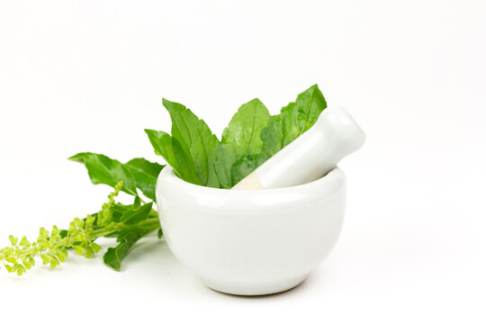
Potential Side Effects and When to Avoid Taking Holy Basil
Potential Side Effects of Holy Basil
Holy Basil is generally considered safe for most people when consumed in moderate amounts. However, some people may experience side effects when consuming Holy Basil. Here are some of the potential side effects of Holy Basil:
- Low Blood Sugar
Holy Basil has been found to have hypoglycemic effects, meaning it can lower blood sugar levels. This can be beneficial for people with diabetes, but it can also be harmful for people who are taking medication to lower their blood sugar levels. If you are taking medication for diabetes, it is important to consult with a healthcare provider before consuming Holy Basil.
- Bleeding Disorders
Holy Basil has been found to have anticoagulant effects, meaning it can thin the blood and increase the risk of bleeding. If you have a bleeding disorder or are taking medication to thin the blood, it is important to consult with a healthcare provider before consuming Holy Basil.
- Pregnancy and Breastfeeding
There is limited research on the safety of Holy Basil during pregnancy and breastfeeding. It is best to avoid consuming Holy Basil during pregnancy and breastfeeding to prevent any potential adverse effects.
- Allergic Reactions
Some people may experience allergic reactions when consuming Holy Basil. Symptoms of an allergic reaction may include rash, hives, itching, and difficulty breathing. If you experience any of these symptoms after consuming Holy Basil, it is important to seek medical attention immediately.
When to Avoid Taking Holy Basil
In addition to the potential side effects of Holy Basil, there are certain situations where it is best to avoid taking this herb. Here are some of the situations where it is best to avoid taking Holy Basil:
- Surgery
Holy Basil has been found to have anticoagulant effects, meaning it can thin the blood and increase the risk of bleeding. If you are scheduled for surgery, it is best to avoid consuming Holy Basil for at least two weeks before the procedure to prevent any potential bleeding complications.
- Medications
Holy Basil can interact with certain medications, including blood sugar-lowering medications and medications that thin the blood. If you are taking any medications, it is important to consult with a healthcare provider before consuming Holy Basil to prevent any potential adverse interactions.
- Allergies
If you have a known allergy to Holy Basil or other members of the mint family, it is best to avoid consuming this herb to prevent any potential allergic reactions.
